翻译三无主句译法
翻译三:无主句译法
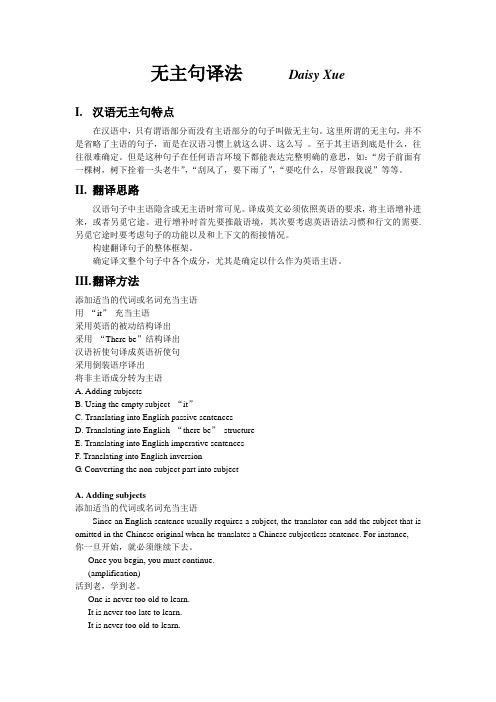
无主句译法Daisy XueI. 汉语无主句特点在汉语中,只有谓语部分而没有主语部分的句子叫做无主句。
这里所谓的无主句,并不是省略了主语的句子,而是在汉语习惯上就这么讲、这么写。
至于其主语到底是什么,往往很难确定。
但是这种句子在任何语言环境下都能表达完整明确的意思,如:“房子前面有一棵树,树下拴着一头老牛”,“刮风了,要下雨了”,“要吃什么,尽管跟我说”等等。
II. 翻译思路汉语句子中主语隐含或无主语时常可见。
译成英文必须依照英语的要求,将主语增补进来,或者另觅它途。
进行增补时首先要推敲语境,其次要考虑英语语法习惯和行文的需要.另觅它途时要考虑句子的功能以及和上下文的衔接情况。
构建翻译句子的整体框架。
确定译文整个句子中各个成分,尤其是确定以什么作为英语主语。
III. 翻译方法添加适当的代词或名词充当主语用“it”充当主语采用英语的被动结构译出采用“There be”结构译出汉语祈使句译成英语祈使句采用倒装语序译出将非主语成分转为主语A. Adding subjectsB. Using the empty subject “it”C. Translating into English passive sentencesD. Translating into English “there be”structureE. Translating into English imperative sentencesF. Translating into English inversionG. Converting the non-subject part into subjectA.Adding subjects添加适当的代词或名词充当主语Since an English sentence usually requires a subject, the translator can add the subject that is omitted in the Chinese original when he translates a Chinese subjectless sentence. For instance,你一旦开始,就必须继续下去。
翻译理论(汉译英)
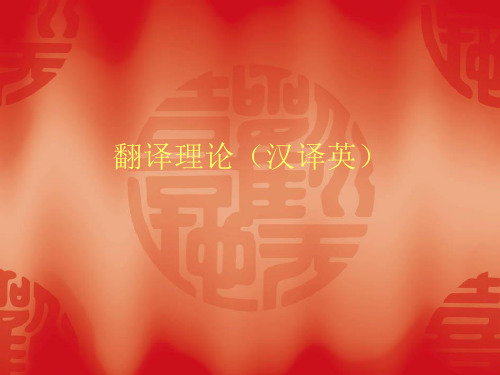
六、表示谚语的无主句英译时可译为无主句,
亦可译为人称句,要视情况而定 a)三思而后行。 First think,then speak. b)入乡随俗 When in Rome,do as the Romans do. c)活到老,学到老。 One is never too old to learn. d)不入虎穴,焉得虎子。 He who would search for pearls must dive deep.Nothing venture, nothing have.
翻译理论(汉译英)
第一章汉语单句句型的翻译(一)
第一节 无主语的译法 无主句,顾名思义,就是没有主语的句子。
英语中除谚语外,只有省略了主语的祈使句为 无主句。而汉语中无主句却比比皆是,一般用 来表示自然现象、命令、谚语、存现、叙述等 意义。汉语的无主句翻译时常采用下列方式: 一、表示自然现象,时间,距离的无主句一般 译作英语的无人称句 英语的无人称句由“代词it”作主语,其表意 功能与汉语表自然现象、时间、距离的无主句 相同,翻译时常可对译。如:
汉语的动词无词形变化,而英语的非限定动词有不 定式与分词的区别,翻译英中必须注意宾补动词形式 的运用。“使、令”类兼语式的宾补多为不定式, 有的动词只能用分词作宾朴,有的不定式,分词皆 有,意思不同,须加区别使用。 如: a)不要让你妈一直等你。 Don't keep your mother waiting. b)这话使我们都笑了。 The words set us all laughing c)他觉得房子在摇动。 He felt the house shaking 1)当动词是“keep,catch,set,feel”等时。宾补 动词应用现在分词以表进行中的动作。
英语翻译六大技巧个个实用
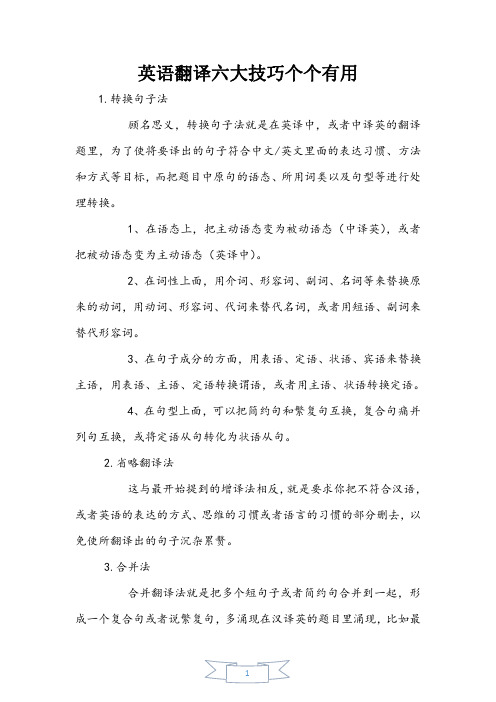
英语翻译六大技巧个个有用1.转换句子法顾名思义,转换句子法就是在英译中,或者中译英的翻译题里,为了使将要译出的句子符合中文/英文里面的表达习惯、方法和方式等目标,而把题目中原句的语态、所用词类以及句型等进行处理转换。
1、在语态上,把主动语态变为被动语态(中译英),或者把被动语态变为主动语态(英译中)。
2、在词性上面,用介词、形容词、副词、名词等来替换原来的动词,用动词、形容词、代词来替代名词,或者用短语、副词来替代形容词。
3、在句子成分的方面,用表语、定语、状语、宾语来替换主语,用表语、主语、定语转换谓语,或者用主语、状语转换定语。
4、在句型上面,可以把简约句和繁复句互换,复合句痛并列句互换,或将定语从句转化为状语从句。
2.省略翻译法这与最开始提到的增译法相反,就是要求你把不符合汉语,或者英语的表达的方式、思维的习惯或者语言的习惯的部分删去,以免使所翻译出的句子沉杂累赘。
3.合并法合并翻译法就是把多个短句子或者简约句合并到一起,形成一个复合句或者说繁复句,多涌现在汉译英的题目里涌现,比如最末会翻译成定语从句、状语从句、宾语从句等等。
这是由于汉语句子里面酷爱所谓的“形散神不散”,即句子结构松散,但其中的语意又是紧密相连的,所以为了表达出这种感觉,汉语多用简约句进行写作。
而英语则不同,它比较强调形式,结构严谨,所以会多用繁复句、长句。
因此,汉译英时还需要留意介词、连词、分词的运用。
4.拆分法当然,英译汉的时候,就要采用完全相反的战术――拆分法,即把一个长难句细细拆分为一个个小短句、简约句,并适当补充词语,是句子通顺。
最末,留意还需要依据汉语习惯调整语序,达到不仅能看懂而且不拗口的目标。
5.插入法就是把不能处理的句子,利用括号、双逗号等插入到所翻译的句子中,不过这种方法多用在笔译里面,口译用的特别少。
总而言之,以上这五种方法是翻译里面比较有用的方法,假如都掌控的话,那么可以有效的提高翻译水平。
6.增译法指依据英汉两种语言不同的思维方式、语言习惯和表达方式,在翻译时增加一些词、短句或句子,以便更精确地表达出原文所包含的意义。
汉译英翻译技巧

汉译英翻译技巧汉译英翻译技巧一、分清主从(Subordination)汉语句中各分句关系比较松散,所以在动笔前应认真分析句子要旨所在。
句中重点往往在后。
英译时,要突出重点或主句,其他部分可分别用介词短语,非谓语动词形式或各种从句表示。
1、没有农业,人们就不能生存,社会生产就不能继续下去。
Without agriculture, people cannot exist, neither can social productionproceed.2、他们一听到“反霸”就火冒三丈,这充分暴露了他们那霸权主义的蛮横嘴脸。
The fact that they fly into a rage at a mere mention of the expression“anti-hegemony”is enough to reveal their true colours as a domineering hegemonists.3、有人以为社会主义就了不起,一点缺点也没有,哪有这个事?Some believe that socialism is just perfect, without a single flaw. How canthat be true?4、但是,象我们常说的那样,道路总是曲折的,前途总是光明的。
But as we have often said, while the road ahead is tortuous, the future isbright.二、选词用字(Diction)在汉译英时应特别注意选找与原文中在意义上和风味上尽可能都类似的词语。
1、每个民族都有它的长处,不然它为什么能存在?为什么能发展?Every nation has its own strong points. If not, how can it survive? How can it progress?2、树雄心,立壮志,向科学技术现代化进军。
无主句的翻译
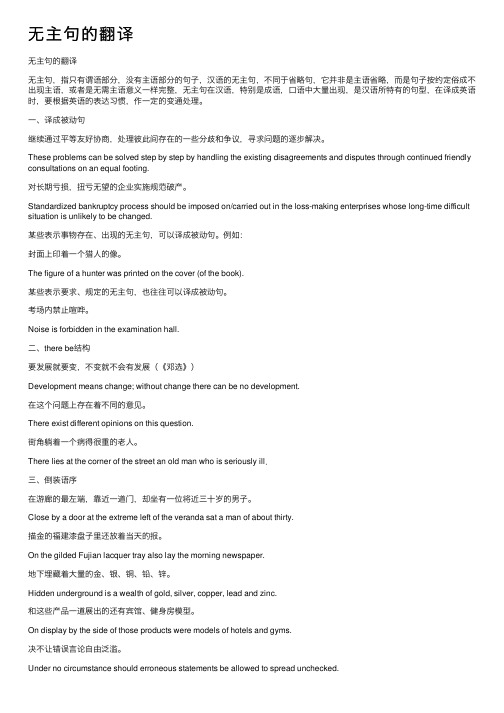
⽆主句的翻译⽆主句的翻译⽆主句,指只有谓语部分,没有主语部分的句⼦,汉语的⽆主句,不同于省略句,它并⾮是主语省略,⽽是句⼦按约定俗成不出现主语,或者是⽆需主语意义⼀样完整,⽆主句在汉语,特别是成语,⼝语中⼤量出现,是汉语所特有的句型,在译成英语时,要根据英语的表达习惯,作⼀定的变通处理。
⼀、译成被动句继续通过平等友好协商,处理彼此间存在的⼀些分歧和争议,寻求问题的逐步解决。
These problems can be solved step by step by handling the existing disagreements and disputes through continued friendly consultations on an equal footing.对长期亏损,扭亏⽆望的企业实施规范破产。
Standardized bankruptcy process should be imposed on/carried out in the loss-making enterprises whose long-time difficult situation is unlikely to be changed.某些表⽰事物存在、出现的⽆主句,可以译成被动句。
例如:封⾯上印着⼀个猎⼈的像。
The figure of a hunter was printed on the cover (of the book).某些表⽰要求、规定的⽆主句,也往往可以译成被动句。
考场内禁⽌喧哗。
Noise is forbidden in the examination hall.⼆、there be结构要发展就要变,不变就不会有发展(《邓选》)Development means change; without change there can be no development.在这个问题上存在着不同的意见。
转态译法
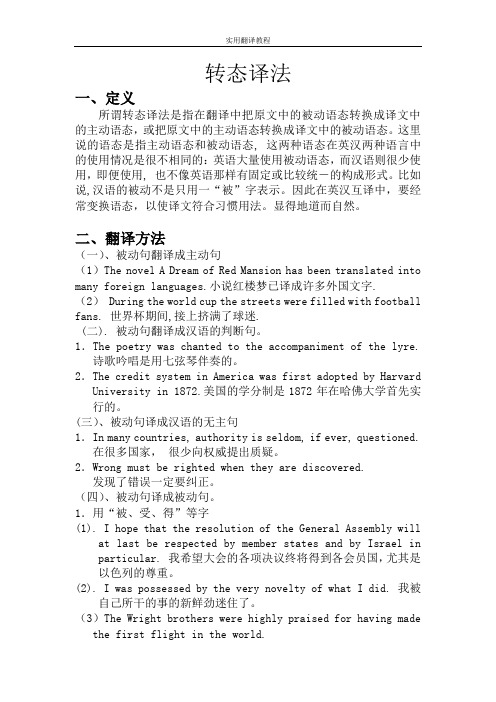
转态译法一、定义所谓转态译法是指在翻译中把原文中的被动语态转换成译文中的主动语态,或把原文中的主动语态转换成译文中的被动语态。
这里说的语态是指主动语态和被动语态, 这两种语态在英汉两种语言中的使用情况是很不相同的:英语大量使用被动语态,而汉语则很少使用,即便使用, 也不像英语那样有固定或比较统-的构成形式。
比如说,汉语的被动不是只用一“被”字表示。
因此在英汉互译中,要经常变换语态,以使译文符合习惯用法。
显得地道而自然。
二、翻译方法(一)、被动句翻译成主动句(1)The novel A Dream of Red Mansion has been translated into many foreign languages.小说红楼梦已译成许多外国文字.(2) During the world cup the streets were filled with football fans. 世界杯期间,接上挤满了球迷.(二). 被动句翻译成汉语的判断句。
1.The poetry was chanted to the accompaniment of the lyre.诗歌吟唱是用七弦琴伴奏的。
2.The credit system in America was first adopted by Harvard University in 1872.美国的学分制是1872年在哈佛大学首先实行的。
(三)、被动句译成汉语的无主句1.In many countries, authority is seldom, if ever, questioned.在很多国家,很少向权威提出质疑。
2.Wrong must be righted when they are discovered.发现了错误一定要纠正。
(四)、被动句译成被动句。
1.用“被、受、得”等字(1). I hope that the resolution of the General Assembly willat last be respected by member states and by Israel in particular. 我希望大会的各项决议终将得到各会员国,尤其是以色列的尊重。
汉英翻译2-句子的翻译
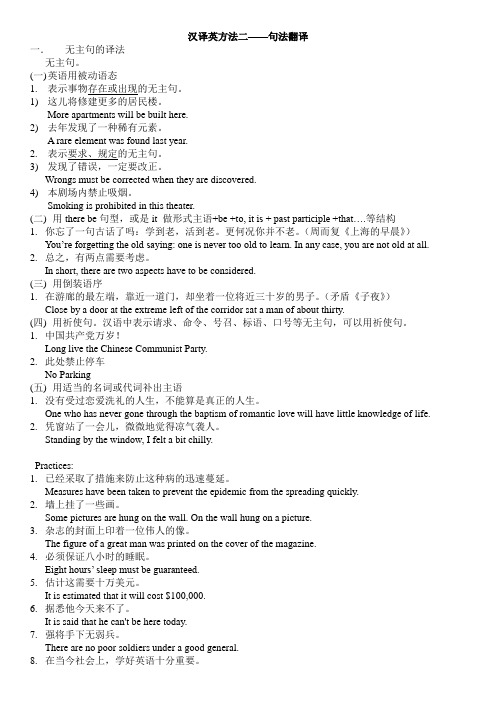
汉译英方法二——句法翻译一.无主句的译法无主句。
(一)英语用被动语态1.表示事物存在或出现的无主句。
1)这儿将修建更多的居民楼。
More apartments will be built here.2)去年发现了一种稀有元素。
A rare element was found last year.2.表示要求、规定的无主句。
3)发现了错误,一定要改正。
Wrongs must be corrected when they are discovered.4)本剧场内禁止吸烟。
Smoking is prohibited in this theater.(二)用there be句型,或是it 做形式主语+be +to, it is + past participle +that….等结构1.你忘了一句古话了吗:学到老,活到老。
更何况你并不老。
(周而复《上海的早晨》)You’re forgetting the old saying: one is never too old to learn. In any case, you are not old at all.2.总之,有两点需要考虑。
In short, there are two aspects have to be considered.(三)用倒装语序1.在游廊的最左端,靠近一道门,却坐着一位将近三十岁的男子。
(矛盾《子夜》)Close by a door at the extreme left of the corridor sat a man of about thirty.(四)用祈使句。
汉语中表示请求、命令、号召、标语、口号等无主句,可以用祈使句。
1.中国共产党万岁!Long live the Chinese Communist Party.2.此处禁止停车No Parking(五)用适当的名词或代词补出主语1.没有受过恋爱洗礼的人生,不能算是真正的人生。
翻译的基本技巧--被动语态的翻译.
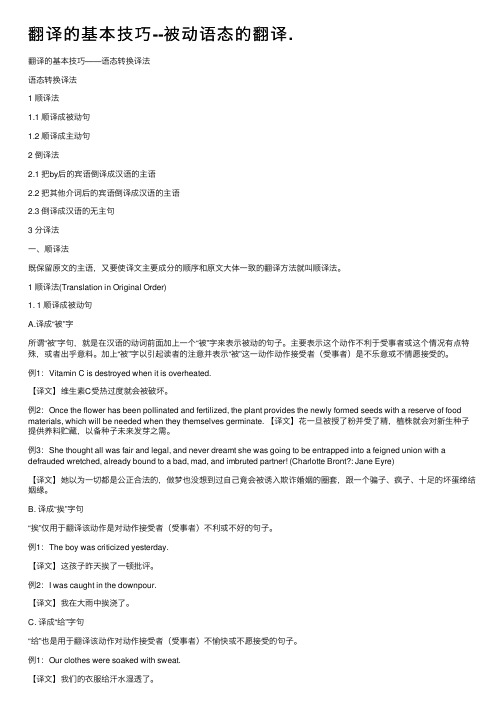
翻译的基本技巧--被动语态的翻译.翻译的基本技巧——语态转换译法语态转换译法1 顺译法1.1 顺译成被动句1.2 顺译成主动句2 倒译法2.1 把by后的宾语倒译成汉语的主语2.2 把其他介词后的宾语倒译成汉语的主语2.3 倒译成汉语的⽆主句3 分译法⼀、顺译法既保留原⽂的主语,⼜要使译⽂主要成分的顺序和原⽂⼤体⼀致的翻译⽅法就叫顺译法。
1 顺译法(Translation in Original Order)1. 1 顺译成被动句A.译成“被”字所谓“被”字句,就是在汉语的动词前⾯加上⼀个“被”字来表⽰被动的句⼦。
主要表⽰这个动作不利于受事者或这个情况有点特殊,或者出乎意料。
加上“被”字以引起读者的注意并表⽰“被”这⼀动作动作接受者(受事者)是不乐意或不情愿接受的。
例1:Vitamin C is destroyed when it is overheated.【译⽂】维⽣素C受热过度就会被破坏。
例2:Once the flower has been pollinated and fertilized, the plant provides the newly formed seeds with a reserve of food materials, which will be needed when they themselves germinate. 【译⽂】花⼀旦被授了粉并受了精,植株就会对新⽣种⼦提供养料贮藏,以备种⼦未来发芽之需。
例3:She thought all was fair and legal, and never dreamt she was going to be entrapped into a feigned union with a defrauded wretched, already bound to a bad, mad, and imbruted partner! (Charlotte Bront?: Jane Eyre)【译⽂】她以为⼀切都是公正合法的,做梦也没想到过⾃⼰竟会被诱⼊欺诈婚姻的圈套,跟⼀个骗⼦、疯⼦、⼗⾜的坏蛋缔结姻缘。
- 1、下载文档前请自行甄别文档内容的完整性,平台不提供额外的编辑、内容补充、找答案等附加服务。
- 2、"仅部分预览"的文档,不可在线预览部分如存在完整性等问题,可反馈申请退款(可完整预览的文档不适用该条件!)。
- 3、如文档侵犯您的权益,请联系客服反馈,我们会尽快为您处理(人工客服工作时间:9:00-18:30)。
无主句译法Daisy XueI. 汉语无主句特点在汉语中,只有谓语部分而没有主语部分的句子叫做无主句。
这里所谓的无主句,并不是省略了主语的句子,而是在汉语习惯上就这么讲、这么写。
至于其主语到底是什么,往往很难确定。
但是这种句子在任何语言环境下都能表达完整明确的意思,如:“房子前面有一棵树,树下拴着一头老牛”,“刮风了,要下雨了”,“要吃什么,尽管跟我说”等等。
II. 翻译思路汉语句子中主语隐含或无主语时常可见。
译成英文必须依照英语的要求,将主语增补进来,或者另觅它途。
进行增补时首先要推敲语境,其次要考虑英语语法习惯和行文的需要.另觅它途时要考虑句子的功能以及和上下文的衔接情况。
构建翻译句子的整体框架。
确定译文整个句子中各个成分,尤其是确定以什么作为英语主语。
III. 翻译方法添加适当的代词或名词充当主语用“it”充当主语采用英语的被动结构译出采用“There be”结构译出汉语祈使句译成英语祈使句采用倒装语序译出将非主语成分转为主语A. Adding subjectsB. Using the empty subject “it”C. Translating into English passive sentencesD. Translating into English “there be”structureE. Translating into English imperative sentencesF. Translating into English inversionG. Converting the non-subject part into subjectA.Adding subjects添加适当的代词或名词充当主语Since an English sentence usually requires a subject, the translator can add the subject that is omitted in the Chinese original when he translates a Chinese subjectless sentence. For instance,你一旦开始,就必须继续下去。
Once you begin, you must continue.(amplification)活到老,学到老。
One is never too old to learn.It is never too late to learn.It is never too old to learn.不入虎穴,焉得虎子。
If one does not enter a tiger’s den, how can one get a tiger’s cub?Nothing ventured, nothing gained.不识庐山真面目,只缘身在此山中。
We can’t get a good view of the mountain we’re standing in.不以物喜,不以己悲。
We should not get affected by things around us, however stirring they may; neither should we feel sad about our misfortune.忍一时风平浪静,退一步海阔天空。
If you are patient during one moment of anger, you will escape a hundred days of sorrow.只有走着瞧了。
Only time can tell.弄不好,就会前功尽弃。
If things are not properly handled, our work will have been in vain.白天里一定要做的事,一定要说的话,现在都可不理。
All that one is obliged to do, or say, in the daytime, can very well be cast aside now. (朱自清《荷塘月色》,朱纯深译)这几天心里颇不宁静,今晚在院子里坐着乘凉,忽然想起日日走过的荷塘……I have felt quite upset recently. Tonight, when I was sitting in the yard enjoying the cool, it occurred to me that the Lotus Pond……(同上)B. Using the empty subject “it”“It”in English is always used for weather, time, and some other natural phenomena. Some of the Chinese subjectless sentences describing natural phenomena or time can be translated into English sentences with “it”being the subject.十点钟了,他还没有回来。
It's ten o'clock now. He didn't return home yet.下雨了,我们快走吧。
It's raining now; let's hurry up.要解决问题,还须做系统而周密的调查工作和研究工作。
In order to solve a problem it is necessary to make a systematic and thorough investigation and study.要成功,就要付出劳动。
It will cost one / you a lot of effort to succeed in anything.能不能提前完成计划呢?Is it possible to carry out the plan ahead of time?不是因为不存在问题,而是因为看不见问题。
It is not that the problem is not there; it is just not visible.青天白日点灯笼—白费蜡。
It is not necessary to light a candle to the sun.重要的是保持理性。
重要的是不再等待,而是安顿下来,是自己过得舒服,……It’s important to stay rational. It’s important to stop waiting and settle down and make ourselves comfortable,... (Unit 5)很容易产生这样的印象:贿赂以及其他可疑开支正日渐增多。
It is difficult to resist the impression that bribery and other questionable payments are on the increase. (Unit 6)是否有可能制订一套公司法则,防止各种类型的贿赂呢?Is it possible to devise a code of rules for companies that would prohibit bribery in all its forms? (Unit 6)C. Translating into English passive sentences必须保证产品质量。
The quality of product must be guaranteed.去年发现了一种稀有元素。
A rare element was found last year.封面上印着一个猎人的像。
The figure of a hunter was printed on the cover.没有爱心,就无法了解人生。
Life cannot be understood without much charity.给了他两天时间来作必要的准备。
Two days were allowed him to make the necessary preparations.He was allowed two days to make the necessary preparations.为什么总把这些麻烦事推给我呢?Why should all the unpleasant jobs be pushed on to me?希望今后上海能够与更多的外国城市结为友好城市。
It is hoped that Shanghai will establish friendly relationships with more foreign cities in future. 后来发现,这家公司也打算资助美国推翻智利政府的秘密行动。
The same company, it was revealed, was ready to finance secret US efforts to throw out the government of Chile. (Unit 6)据闻其他国家也是如此,向外国公司施压,要他们向党派组织的账户捐款。
Other countries have also been known to put pressure on foreign companies to make donations to party bank accounts. (Unit 6)D. Translating into English “There be”structure除了枪声,再没有其他声音了。
There was no sound but that of gunfire.要发展就要变,不变就不会发展。
Development means change;without change,there can be no development.在经济建设的实践中,已经涌现了大批的优秀人才。
There have emerged a large number of talented persons in economic construction.不努力就不会成功。
There is no success without effort.好多年以前,这个村子里住着六个盲人。
A long, long time ago, there lived six blind men in this village.楼下有人想和你说话。
